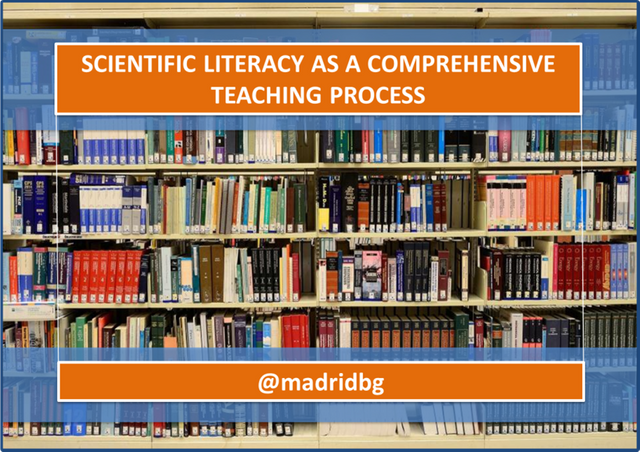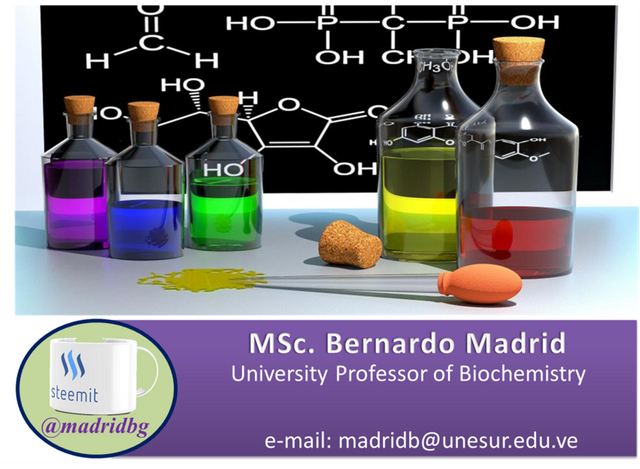SCIENTIFIC LITERACY AS A COMPREHENSIVE TEACHING PROCESS

Authored by @madridbg, via Power Point 2010, using public domain images.
Greetings and welcome dear users and readers of this prestigious platform and especially those who make daily life in the community @education, This publication is aimed at the analysis of a scientific literacy as a comprehensive teaching process that allows members of our society to know about scientific aspects and their interrelationship with technological advances and their influence on society.
In this first installment, we will address some generalities on the subject of literacy, which we will reinforce and deepen in subsequent publications.
So literacy in the opinion of Garmendia, 2015:
"It is a right that every citizen of a country has, and it is the responsibility of this, to take the fundamental measures to ensure that each individual acquires a timely and quality training."
Thus, the literacy process requires a social approach and citizen participation that starts from the individuality of the participants, this process with the proper guidance allows people to achieve a process of continuous participation that allows them to transform their realities at the political, economic and social level.

Fig. 2. It is necessary to achieve that the individuals of a society manage to think and act independently, as Albert Einstein did. Author: ParentRap
Thus, when we add the scientific component to the literacy process, we achieve from the classroom, the formation of committed and conscious individuals who have the ability to build their own assertive criteria, with valid argumentation that allows them to focus and solve real problems in our societies.
This process is generated when the harmonious integration between the scientific and the everyday is achieved, starting from the fact that science and its abstract approach do not work in isolation, on the contrary all its principles are designed to understand every aspect of our reality, hence the need to generate scientific literacy as a dynamic process that involves problems of economic, social, scientific and for many environmental and where people have the ability to work actively in solving problems in each of these variables.
In this sense, at the educational level, scientific literacy is designed to make it easier for students to learn scientific content, as well as to encourage interest in science and create in them an awareness that makes them sensitive to the benefits and problems inherent in the scientific-technological development of society and form them as future responsible citizens.

Fig. 3. Scientific literacy goes beyond educating within 4 walls. Author: asint
Hence the need to generate a teaching approach that aims to address scientific issues of social and economic relevance taking into account, as main aspects, the relationship and the development of hypotheses from scientific content, as well as the implementation of analytical techniques that allow through observation and interpretation of data to generate and make assertive decisions for the collective welfare.
FINAL CONSIDERATIONS
Talking about a teaching-learning process that leaves aside traditional teaching, has always generated uncertainty at all levels of education, from formal to informative, however, it is appropriate to recognize that we have been evolving at a surprising speed, hence the need to advance in our way of thinking and seeing the aspects around us and the best way to work each situation, is to have an integral vision of the problem, looking for solutions as well as its repercussions at the scientific, economic and social level, without forgetting the environmental component, which is the main topic for any teaching process, since it has been man's responsibility for the affections that our planet is suffering.
So that the process of scientific literacy, from my perspective should be present in all training curricula and permeate throughout this, always thinking in a holistic view of teaching and learning.
BIBLIOGRAPHIES CONSULTED
[1] CAJAS, FERNANDO. SCIENTIFIC AND TECHNOLOGICAL LITERACY: THE TEACHING TRANSPOSITION OF TECHNOLOGICAL KNOWLEDGE. SCIENCE EDUCATION, 2001, 19 (2), 243-254. Article: Online Access
[2] Garmendia Mujika, Mikel; Guisasola Aranzabal, Jenaro. Scientific literacy in school contexts: The Zientzia Live! Eureka Journal on Science Education and Outreach, vol. 12, no. 2, 2015, pp. 294-310. Association of Teachers Friends of Science: EUREKA Cadiz, Spain. Article: Online Access
OF INTEREST
•

Grateful with the community @project.hope and with all the management team of the same one that they motivate us to continue working in a mutual and balanced growth.


@tipu curate 4
Upvoted 👌 (Mana: 0/8) Get profit votes with @tipU :)